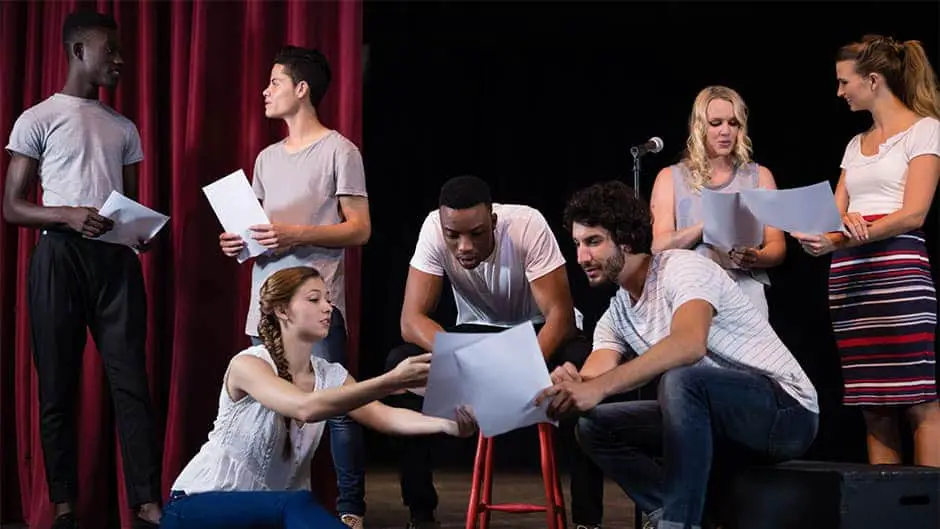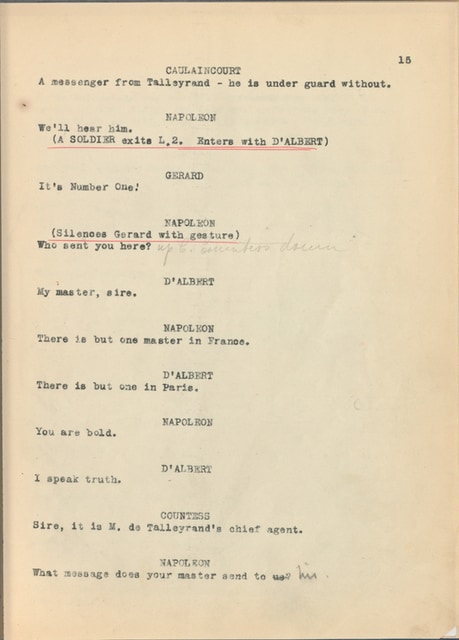There are a number of ways to learn and memorize your lines for a play, screen part, or musical theater. You can learn lines by drilling, dialoguing with a partner, clap to the beat of each word, writing lines on paper, moving your body while reciting, speed reading, highlighting, emphasizing words, whispering lines, and recording lines to name a few. You’ll have your lines down in no time flat using some of the following techniques to learn your lines.

Reciting Lines Out Loud
One of the oldest, but regularly utilized techniques is to read your dialogue out loud phrase by phrase or line by line. Repeat the lines over and over until the lines are firmly in your head. You can read your lines out loud to yourself over and over. Repeat until your lines are firmly down.
Dialogue with a Partner
Dialogue with a Partner to Learn Lines
Another way is to use the script and have another person, either the actual actor in your production or a mate to help you read your lines as a dialogue. This gives you impetus to learning your lines quickly and indicates where and when you should react using the words. Having anothe person to work with you on the lines allows you to hear their dialogue out loud, so you can ascertain the meaning of the interactions in a more meaningful way.
Typically you would hold your script in your hand and they would hold theirs in their hands. Often you’ll be looking down to read your script and while that happens, sometimes the energy of the scene falls, so as you are reading the script try to keep the energy in the moment even if you need to know what is happening next. This is also a very good audition technique.
Clap to a Given Beat Each Word to Learn Lines
As each word is read out loud, clap your hands slowly but in a steady motion. While you are clapping you are to read each word in time to the beat. That means each world no matter how long or short it is, you need to recite it within the given clap, out loud. That means no matter how long the syllables are, you need to fit them into the given clap and so on. If you muddle up, go back to the beginning again.
For example; Clap Clap Clap Clap Clap Clap Clap
Oh Romeo , Romeo. Wherefore art thou Romeo
This gets the rhyme in your mouth, brain and body as you are reciting, which means it’s more likely that you will remember the lines. Remember when words are in the rhythm of your body, it is a visceral effect and your body and brain will remember the lines, even if you think you might forget.
If you get a phrase, a word or a sentence incorrect, you must go back to the beginning and try again until you have all the lines correct. Go over this strategy over and over until you are confident with your words. Try this out loud now.
Write Your Words Down on Paper To Learn Lines
Studies have shown that when you handwrite words, sentences and or phrases that the brain remembers them better than if you type them on a keyboard. Get your pen and paper ready.
- Write out each line quickly.
- Write out each phrase quickly
- Write out the paragraph quickly.
Quote from Lifesavvy.com:
Your memory of handwritten words is tied to the movements required to make each letter. This might be what helps the memory of what we’ve written hang around in our brains a bit longer. Meanwhile, pressing buttons on a keyboard activates fewer areas of the brain, so we forget what we’ve typed faster.
Remember by writing down words, lines with pen and paper, this will boost your memory of the lines which will help you to learn them when you need them for acting. Also do write down your lines over and over to commit them to memory.
Exaggerate Your Lines
Similar to clapping your lines to a rhythmic beat, you can speak your lines out loud, but in an exaggerated manner. This will prompt muscle memory, which will help you remember your lines.
When speak a line such as: “What are you talking about Bob! I never went near your wife that night. She flirted with me!” With this particular line, exaggerate your mouth movements as you speak your lines out loud. This also helps with articulation and expansion of vowel sounds, which is especially good for projecting on the stage.
Walk Around While Reciting Your Lines

A great way of learning yours lines is to walk around your loungeroom or a reasonably large space and recite your lines out loud. By speaking out loud while walking around, your body will transform into an energetic mindset and physically it will encourage muscle memory. When you have these elements, you will more likely be able to remember your lines than sitting down on the couch trying to memorize them. More energy in your body while walking will also remind itself to use energy in your acting while in the movement.
Highlight Your Lines
This is fundamental to most actors amatuer and professional. By highlighting your lines only, this distinguishes your role to that of other actors. It also minimizes confusion. Some actors like to highlight their lines in a certain colour and other actors with different colors, to help them distinguish between all the actors they interact with.
If you have a long monologue or speech a good way of learning your lines is to highlight the beginning, middle and ending. This tells the brain where each section is through visual stimulus, which should tell the brain when and where you are up to with your lines.
It helps if you forget part of your speech to remember the color of the next section, this will hopefully get you back on track.
Speed Reading Your Lines
To help you learn lines, have each person speed read their lines out loud to each other. This helps with spontaneity because you aren’t thinking or anticipating the next line. You are using more of your instincts as you move through your lines quickly. It’s also fun to recite them quickly and keep the spice alive.
Whisper Your Lines
Not only is this a great way to find the instinctual rhythm of the lines, it helps with finding the correct imputeous for the line. Why does this happen? Often when we speak our lines out loud, we can judge our voice in a way which can break our focus away from the proper intentions of the words, to our analytical brain. By that we are using our intellect due to the judgement of our voice rather than the proper impulse which should elicit genuine acting. By whispering you will find the meaning and emphasis as you move through the script. Also it helps with you knowing your lines without pushing your words and therefore producing ham acting.
Record Yourself To Learn Your Lines
One of the best methods I have used is my recording my voice on a device. Difference on my phone I would record my lines and listen to them and then I would recite them out loud.
Another way you can begin to learn your lines using a device, is by recording the other character script or lines and then play it back where line by line on the device. Pause, and then say your line out loud. Then unpause to hear the next line from the dialogue from the other character. This is a good way to learn lines by hearing your other person’s lines which should stimulate you to say your lines thereby learning them as you go.
Learn All the Lines in Your Scene
A great way to learn your lines, it’s for you to learn all the lines in your scene. That also includes learning the other characters lines and the play in your particular scene. Why do we do that? We do that so that we have a full understanding of the script or the scene at hand. It allows us to know fully what is being said by whom and when. This helps us learn our lines and cement them even better. The only problem is that you try not to mimic their lines subtly, while the other character is saying their lines. Which is what amateur actors sometimes do.

Learn Lines By Looking at the Through Line
Probably one of the best ways to learn lines it’s to look over the whole play and draw pictures about the scenes which you are in. This house stimulates your memory by giving a pictorial representation of the same. This also helps you remember what’s happening when and should stimulate your lines action in the. through line your motivation the intentions of your characters will also help here in fact this information should be the underlying factor of your overall acting. Associate pictures with the beats In the scene and learn your lines from the beats.
Find the Why in the Scene to Learn Your Lines
Actors need to find the why in the scene. The need to understand why this character does the particular thing they do or say the particular thing they do. What is happening in the scene and what is the response and why are they doing what they give. Actors, especially amateur actors need to know why this event is happening to help cement the action in the mind. This helps with knowing when a line or action should take place.
Abbreviate your lines new paragraph
For instance if you want to learn your lines and you don’t want dim spelt out to you what you could do is to abbreviate the lines.
For example: What did you think I was going to do? This line could be rewritten as WDYTIWGTD?
This makes writing a lot quicker but also stimulates your brain into action by figuring out what that words are immediately. In fact it’s like texting, but even shorter because your brain does pick up this information very well and reformulates to a meaning, which you already have in your mind. Why not give it a go?

Tips and Tricks When Rehearsing to Help Learn and know Lines
- When you are acting in a play and you forget your line, say ‘line’ to the prompt, this will allow them to know which line you have wrong and they will call it out for you. But keep in mind, you shouldn’t do this too often because if you do, the production team will think you’ve done no work to learn your lines. Just do your best to learn them before you get on stage or in front of the camera.
- Be flexible with learning lines especially on camera. Usually in Television and Movie shoots, you’ll be required to learn and know your lines, but also be prepared to have them changed to better suit the scene. Usually the writers, directors, producers and even the actors themselves and request a change in the script. Be prepared for changes in the script.
- Usually in stage acting you rehearse with a ‘Read Through’ with the cast. You would then be required at a point to use a script in hand to rehearse your lines while blocking the scene. And especially in professional theater, you would be required to have lines down and the script down in the third week, ready to rehearse the scene and use the blocking already set. Typically you should have the set pieces or stand in pieces and props to help with your scene.
- If acting in a play or Musical Theater, do try your best to learn your lines off by heart very quickly. There is nothing worse than an actor who takes forever to learn their lines. In Fact those who do learn their lines quickly and are ready in rehearsal are often seen in a good light, even if it’s not stated. One quote from the Movie star Russell Crowe stated in an interview many years ago that he couldn’t stand actors who didn’t learn their lines ready for rehearsal.
So in conclusion, actors need to learn their lines very quickly to get on with developing their character and being the best performer they can within given time frames. Choose one of the line learning techniques above and learn them off by heart. Those who work the hardest, tend to have their cake and eat it too. Good luck.

